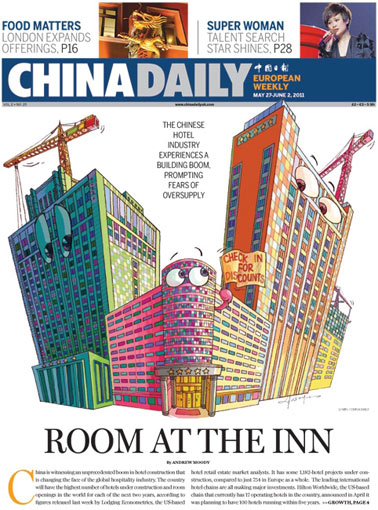Society
WHO urges China to rev up tobacco control
Updated: 2011-05-31 11:30
(Xinhua)
BEIJING - China can use its control over the state monopoly to end tobacco industry interference in tobacco control policy-making in a country where more than 1 million people die of smoking-related illness each year, a World Health Organization (WHO) official said.
"China's tobacco industry is 100 percent state-owned. And this offers tremendous opportunity for the government to bring it under control," Dr. Sarah England, a Beijing-based WHO tobacco control official, told Xinhua in an exclusive interview on the eve of the World No Tobacco Day which falls on Tuesday.
China is the world's largest cigarette producer and consumer. There are about 300 million adult smokers in the country and more than half of Chinese men smoke.
China has ratified the WHO Framework Convention on Tobacco Control (WHO FCTC), pledging strong measures to curb tobacco consumption. The treaty's implementation is in the hands of a multi-agency work group that includes the State Tobacco Monopoly Administration, the regulatory body that shares the same management staff with China National Tobacco Corporation.
China National Tobacco Corporation is the world's largest cigarette maker. Industry figures show that about 2,290 billion sticks of cigarettes were sold in China in 2009, up 40 percent from 2002.
"The tobacco industry is acting against the principles of public health. The WHO FCTC text and guidelines make clear that the tobacco industry should have no influence on tobacco control policy," Dr. England said, adding that the state monopoly is actually an advantage for the government as the government can control the industry's actions and involvement in policy making.
She said Thailand has a similar state tobacco company, but the Thai government manages to firewall the government-owned tobacco industry from the tobacco control policy setting.
"China can look to examples where there is a separation of these functions and consider whether a similar arrangement of firewalling is workable," she said.
Calls to kick tobacco industry representatives out of the multi-agency work group in charge of implementing the WHO treaty have been mounting in the health sector for some time.
A report whose lead authors include a deputy head of the Chinese Center for Disease Control and Prevention (China CDC) said in January that the fundamental reason China has achieved only limited progress on tobacco control is because tobacco industry representatives interfere with the drafting and enforcement of tobacco-control policies.
The WHO has renewed its call for vigilance and concerted action by governments, civil society and communities to stop the interference and enable full implementation of the treaty at this year's World No Tobacco Day.
Dr. England said the biggest barrier to implementation and enforcement of national laws that are consistent with the WHO FCTC is a false belief that tobacco is good for the Chinese economy, which fails to take into account the huge humanitarian and economic cost of death and disease from tobacco.
"People are beginning to question how something that needlessly kills a million Chinese people every year can possibly be good for the country," she said.
The tobacco epidemic kills nearly 6 million people worldwide each year, mostly from heart disease, stroke, cancer and emphysema, according to the WHO. Tobacco-related deaths account for 63 percent of deaths from non-communicable diseases in the world today. Passive or second-hand exposure to tobacco causes an estimated 600,000 deaths a year globally.
The tobacco industry currently generates about 7 percent of the Chinese government's annual revenue. But health experts argue that the tobacco revenue is overshadowed by lost productivity and the overwhelming medical costs linked to the deaths and illnesses caused by tobacco consumption.
"Tobacco is a unique consumer product in that it kills up to half of the people who use it as directed. There is nothing else that is so deadly to consumers. I am confident that the senior leadership of China will make the right decision for the people and do what's necessary to essentially sunset the tobacco industry," Dr. England said.
The WHO official said she was encouraged by the inclusion of tobacco control language for the first time in the government's five year plan this March, a landmark move that signals tobacco control is a supported belief by the Chinese government and the Ministry of Health acted immediately to put an indoor smoking ban in place.
"I think we are going to see a real change in the quality of indoor air in the next year," Dr. England said. "We are very optimistic that China will implement the convention and honor its obligations."
E-paper

Tapping into the future
Foreign companies are investing in China's water industry as many predict a growing profit margin.
Headhunters ride on growth
Commercial property rides wave
Learning from the past
Specials

Cuisine central
London's Chinatown is helping diners appreciate full palate of Chinese food

Tying the knot
Danish couple's high-end macrame export business takes off in the mountains of Yunnan.

Truly a super woman
Li Yuchun first came to prominence in 2005 as the Super Girl winner, and since then has become an international star.
